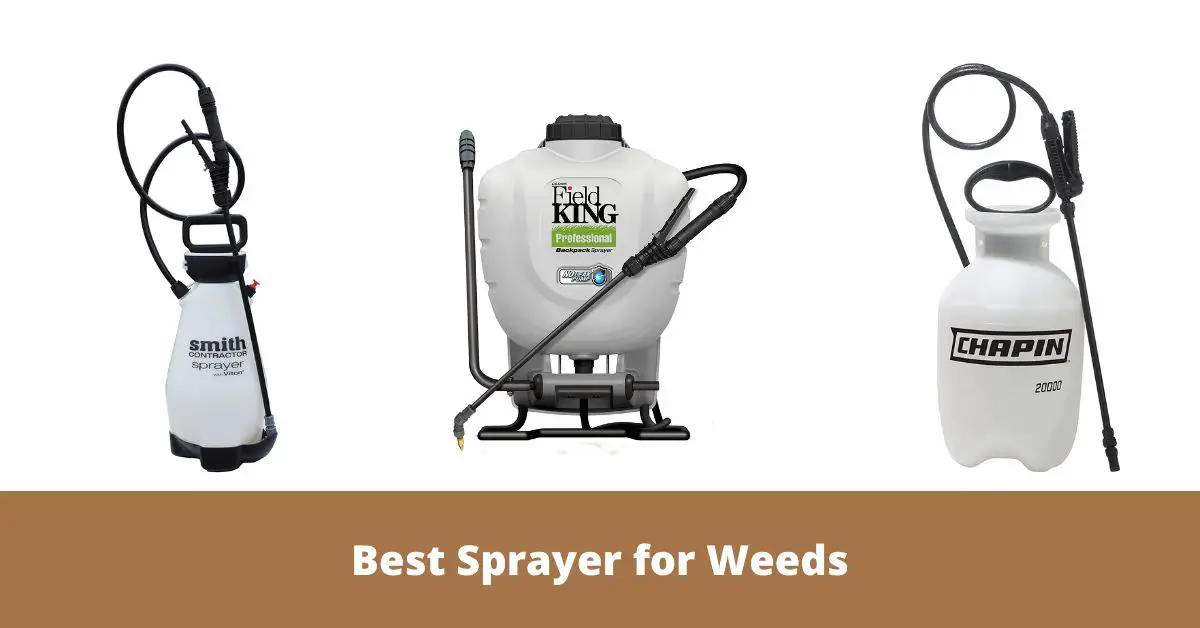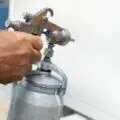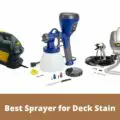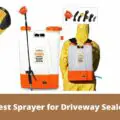Sprayer
Best Sprayer for Weeds
Best Sprayer for Weeds
Don't you hate walking out to enjoy your beautifully tended front yard only to see weeds peeking from the cracks in your driveway? It's a little more than a mild annoyance, I would say.
In fact, it drove me to research the best sprayer for weeds a few years back, and ever since I found the perfect sprayer, weeds have never been an issue again.
When buying my first weed sprayer, I made a lot of costly mistakes. One of them was completely forgetting that my comfort matters the most, which led me to purchase a backpack sprayer with thin straps that would leave painful welts on my shoulders whenever I carried a full load.
To say that I have since refined my search criteria to accommodate the features I value most would be an accurate assessment. Here's my current buying guide for weed sprayers that never fails to get me exactly what I need.
What to Look for in a Weed Sprayer
Portability
The best type of weed sprayer is the type that's easy to move around. You need considerable strength to lug around gallons of weed killer, so it helps if you pick a portable design for your situation.
I recommend getting a wheeled model if you have a very large and flat lawn, backyard, or garden. It's a solid investment if you frequently spray your plants and need a large capacity sprayer that moves around easily.
Most people go with backpack sprayers because they're compact and convenient. They have large capacities, too but going too large risks inducing more fatigue and potential back problems.
Backpack models are ideal for all types of lawns and gardens. They're easy to use and super effective for spraying weeds.
The Nozzle
Always spring for an adjustable nozzle. Ensure it allows you to modify the size of the spray, control the flow rate, and switch to different spraying angles.
My favorite thing about adjustable nozzles is the ability to refine the type of spray you want. You can modify the spray to target the whole plant or adjust it to spray specific parts with high accuracy, reducing wastage.
Type of Pump
Sprayers typically come with one of two types of pumps:
Piston pumps
This mechanism is composed of a piston moving up and down inside a cylindrical tank to create pressure. It can create up to 90 PSI, and higher pressure is ideal for creating smaller droplets that travel further.
Piston pumps work very well with low viscosity liquids like insecticides and herbicides. Furthermore, they are easy to repair.
Diaphragm pumps
The other type of pump you'll encounter is the diaphragm pump, a flat sheet held by screws and flexes up and down to create pressure when you pump the sprayer.
Due to the lack of contact with the cylinder wall, they're considered more durable than piston pumps. You can get up to 60 PSI with one of these pumps, which also work with viscous liquids like abrasive and bleach solutions.
Even though they're repairable, diaphragm pumps take a bit more work to fix.
Capacity
Sprayer tanks can contain as little as eight ounces and as much as five gallons. Make sure you get the right size for the intended job.
It's obvious that having a low-capacity tank necessitates frequent refillings, which can be time-consuming. Aim for a sprayer with enough capacity for your needs.
Weight
The last thing you need is extra weight when you're carrying five gallons on your back. I always check the unit's weight to ensure it doesn't get too heavy when filled.
It'll save you unnecessary back and shoulder fatigue.
The Best Weed Sprayers for Money
Smith Contractor 2-Gallon Weed Sprayer
With over 2,000 five-star reviews on Amazon, I'm certain that I'm not the only one who thinks this is one of the best weed sprayers ever made.
The Smith Contractor is not just affordable but also very versatile. It comes with five nozzles, two of which are adjustable and one designed to create foam.
It comes with some great safety features. One is the pressure release valve, which de-pressurizes the tank to make it safe to open. Without it, chemicals would spill all over you whenever you opened the tank.
Its 21-inch wand gives you a sufficient distance from the spraying action, protecting you from backsplash and errant sprays. It also has commercial-grade shutoff features to minimize chemical corrosion.
Chapin 20000 1-Gallon Weed Sprayer
This is a great option if you need a simple weed sprayer for your lawn. It is compact enough to carry around and versatile enough for a wide range of uses, including weeding, watering, and pest control.
It features an anti-clog sprayer that works even with tank debris. I find it useful when watering plants with slightly sandy water as it still produces a decent amount of spray.
A bonus worth mentioning is that the translucent tank is easy to clean and refill, so it's a low-maintenance sprayer.
Field King 190328 4-Gallon Weed Sprayer
If you're after something with a large capacity, this 4-gallon Field King will work just fine. There are five nozzles included, two of which are flat fans that I find really effective for fanning out the spray.
It has a piston pump that delivers up to 150 PSI, which is just what you need to create extra small droplets that travel farther.
It also features a 21-inch poly wand that allows it to do the work of a diaphragm pump using Viton seals, which makes it compatible with wet table powders.
Since it's a touch more expensive, it also comes with a lockable brass shutoff and an in-line filter. The pump is also easy to access, which means you can easily swap out tools when needed.
I bought this because I needed a sprayer that could work with Tee Jet nozzles, which minimize foliar coverage in standing crops, preventing fertilizer burns. Although you won't need it to spray weeds, it is a useful feature if you intend to do some gardening as well.
Why You Should Trust Us
At Woodworking Tool Guide, we know one size doesn't fit all! We cater to every woodworker, from beginner to pro, with insights and recommendations tailored to your skill level, project needs, and budget. We take the guesswork out of choosing the right tools, whether you're tackling your first crafting a masterpiece for the ages. So grab your chisel, join our community, and let's build something amazing together!
Woodworking Tool Guide wasn't just born, it sprouted from a seed of passion for the craft. What started as a joyful exploration blossomed into a trusted online haven for fellow enthusiasts like you. We pour our love into meticulously chosen review selections, meticulous hands-on testing, and lab-backed insights, all to empower you with reliable, comprehensive information you can build on. So, grab your tools, trust our guidance, and let's build something beautiful together!
Passion-Driven Expertise
Our journey started with a shared love for woodworking. The team behind the Woodworking Tool Guide is comprised of individuals who are not just writers but passionate woodworkers themselves. This shared enthusiasm ensures that our content is crafted with a deep understanding of the craft and an authentic appreciation for quality tools.
Top Tool Guides Online
Woodworking Tool Guide has rapidly ascended to become one of the premier online destinations for tool guidance. Our commitment to excellence and the accuracy of our information has positioned us as a reliable source for both beginners and seasoned woodworkers seeking trustworthy advice on the best tools for their projects.
User-Centric Approach
Our content caters to every woodworker, from rookies just starting out to seasoned pros tackling intricate projects. We tailor our insights and recommendations to your skill level, project needs, and budget, ensuring you find the perfect tools to match your unique woodworking journey. So step into your workshop, grab your tool belt, and let Woodworking Tool Guide be your trusted companion as you craft your masterpieces.
Continuous Support and Innovation
Woodworking is an ever-evolving craft, and so is our commitment to supporting you. We are dedicated to bringing you the latest information on woodworking tools, techniques, and trends. Our team is actively working to expand our content and bring you more valuable insights, ensuring that you stay well-informed in your woodworking adventure.
Hands-On Experience
Ditch the endless research rabbit hole! At Woodworking Tool Guide, we believe in actionable advice, not armchair analysis. We get our hands dirty, putting every tool through its paces in real-world woodworking scenarios. Whether it's the precision of a table saw, the versatility of a router, or the tactile satisfaction of a handplane, we test for performance, durability, and user-friendliness. No more sifting through dry specs – we deliver practical insights you can trust to transform your woodworking dreams into reality.
Woodworking Tool Guide isn't just a review site, it's your trusted companion on the sawdust-filled path to woodworking mastery. Our expert team, led by veteran David Jones, meticulously tests and explains tools in terms you understand. We cut through the jargon, bias, and confusion with real-world insights and honest evaluations. Join our passionate community, where decades of experience, cutting-edge knowledge, and shared love for the craft come together to guide you every step of the way. So grab your chisel, buckle up, and let's embark on this exciting woodworking adventure, together!








